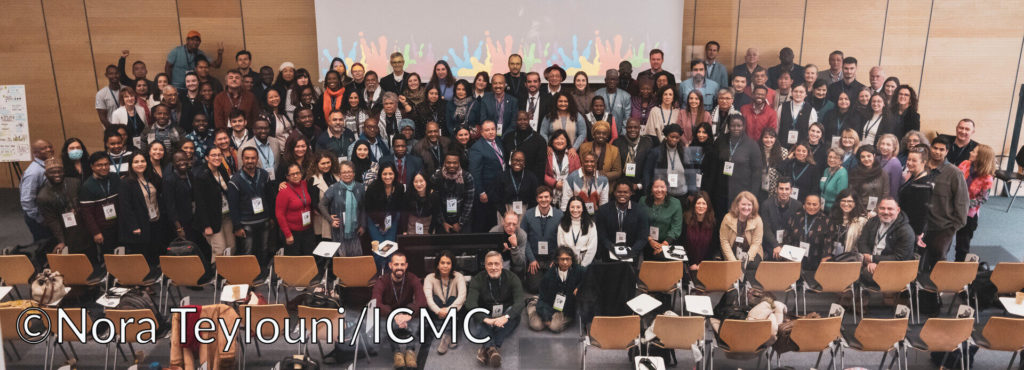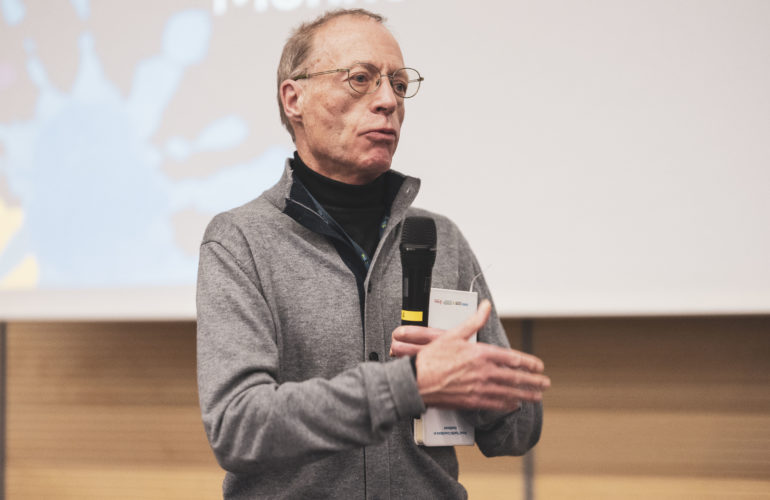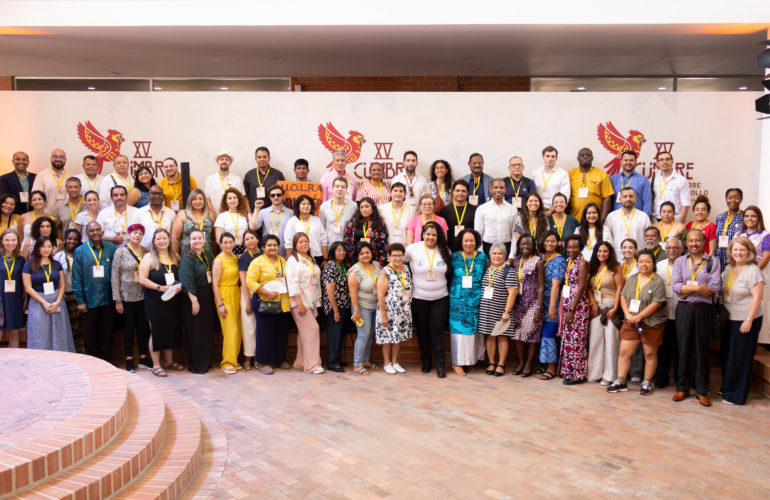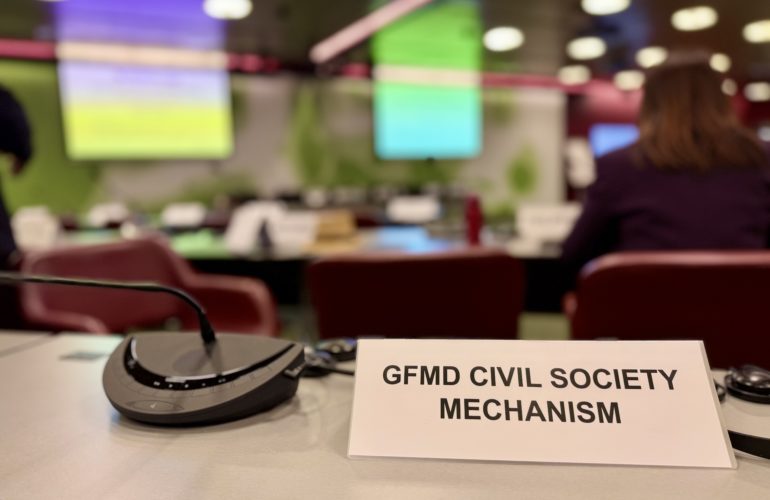Reflections on the Global Forum on Migration and Development, and Particularly on the 14th GFMD Summit
By Stéphane Jaquemet, ICMC Chief Operating Officer and Director of Policy

The 14th Summit of the Global Forum on Migration and Development (GFMD) marked the beginning of the year for ICMC’s Policy Department. The GFMD is a State-led process dedicated to discussions on migration and development and to collaboration between a diverse range of participants including national governments, local governments, civil society, the business sector, and youth. This edition of the GFMD Summit, which took place from 23 – 25 January 2024, brought together in Geneva 110 civil society delegates from 42 countries.
Since 2011, the International Catholic Migration Commission (ICMC) houses the GFMD Civil Society Mechanism‘s Secretariat and coordinates civil society’s activities to bring joint advocacy messages to the GFMD. In this opinion piece, ICMC’s Chief Operating Officer and Director of Policy Stéphane Jaquemet reviews the history of civil society participation in the GFMD and shares his impressions – and those of civil society delegates – regarding this latest Summit.
Since the creation of the Global Forum on Migration and Development (GFMD) in 2006, civil society has been part of its fabric. The GFMD is an intergovernmental process characterised by its flexibility, informality, and capacity to discuss sensitive issues in a non-threatening and non-judgmental environment. Eighteen years ago, and no doubt also today, governments had difficulty considering that migration was a governance issue to be discussed responsibly at the international and multilateral level, and among a range of stakeholders.
Since the end of World War II, the prevailing view had been that migration was part and parcel of unrestrained State sovereignty, which meant that governments had full control of their territory and borders, and could accept or reject any individual at will, except refugees, a specific, well-defined, and very limited category. In short, migration was no one else’s business.
As an inter-governmental, non-UN process that was beginning to open up to civil society, the GFMD represented, if not a ‘mini revolution’, at least a willingness of governments to listen to and be inspired by others. It was also a recognition that migration had an international dimension and that migrants had some form of protection against ‘arbitrary’ government decisions.
Until 2011, civil society, the only interlocutor of governments, had a limited and rather symbolic presence in the GFMD (relevant international organizations such as IOM, UNHCR, or ILO, were also invited to provide their expertise). This shifted dramatically when Switzerland assumed the chairmanship and broadened civil society’s engagement, both in terms of direct participation in the actual GFMD Summit and through civil society’s own self-organizing. On the invitation of the Swiss Chair, the International Catholic Migration Commission (ICMC) took responsibility for coordinating the civil society process in its entirety, working together on the themes and outlines for the civil society activities with a core group of 15 civil society leaders and consulting with over 200 diverse individuals and organizations. The direct interaction with governments took place on a dedicated day, called ‘Common Space’, an initiative launched in 2010 by the previous Chair, Mexico, while the rest of the Summit was restricted to governments (civil society participants had their own parallel and separate meetings called ‘Civil Society Days’).
Since 2011, every GFMD Summit has seen an incremental interface between civil society and governments. In 2015 and 2020, respectively, business leaders and local authorities became other distinct mechanisms of the GFMD, while youth was also recognized as an independent, cross-cutting constituency in 2020. Germany, Morocco, and Ecuador progressively led the way to a GFMD Summit opened to all without restriction, which was the case at the United Arab Emirates Summit held in January 2022 (this latter Summit was unfortunately held online, rather than in Dubai as initially contemplated, due to the COVID-19 pandemic).
The 2024 GFMD Summit, under the French Chairmanship, was the first post-pandemic Summit and the first in-person one to be totally open to all participants, but it was also the first to be held in a country other than that of the Chair. France had informed governments and stakeholders in April 2023 that the Summit would take place in Geneva. According to the French Chair, the decision was preferred due to the congested 2024 agenda in Paris, which includes the 2024 Olympic Games and the Summit of the Francophonie.
These restrictions upset civil society participants, who hoped that a post-COVID GFMD Summit would reconfirm the GFMD’s DNA, composed of informality, flexibility, open dialogue, and innovation. There was the feeling that the GFMD was progressively losing its identity and specificity and turning into just ‘another UN meeting’, where civil society space is limited and controlled,
Stéphane Jaquemet, ICMC Chief Operating Officer and Director of Policy
Also, for the first time since 2011, civil society’s participation was limited to 120 people, about half of the total welcomed at previous summits. This restriction was linked both to the limited capacity of the Geneva Conference Center, and concerns expressed by the Chair and other governments about ensuring the intergovernmental nature of the forum and civil society not having an ´overwhelming´ presence. In addition, and following the same logic, initially only two civil society representatives (additional to civil society panel speakers already present at some roundtables) were allowed to take part and speak at each of the roundtables, with other civil society participants being able to listen in overflow rooms. Eventually, however, at the start of each roundtable the Chair opened ad-hoc entry to many more civil society participants, since the rooms had ample available space.
These restrictions upset civil society participants, who hoped that a post-COVID GFMD Summit would reconfirm the GFMD’s DNA, composed of informality, flexibility, open dialogue, and innovation. There was the feeling that the GFMD was progressively losing its identity and specificity and turning into just ‘another UN meeting’, where civil society space is limited and controlled, as was amply demonstrated during the International Migration Review Forum (IMRF) held in New York in May 2022.

Why invest in an 18-month civil society preparation process, why meet every month, why form working groups, why organise sophisticated preparatory meetings, why prepare separate papers for each of the roundtables, if in the end we cannot have the full civil society diversity in the GFMD? Those questions were asked many, many times, and influenced many of our discussions in the preparatory meetings.
But what I find remarkable is that these difficulties, instead of discouraging civil society, made it more resilient. Its fighting spirit, its faith in a better world, its belief in human dignity, respect for human rights, and migrants’ agency, were not only unaltered but were stronger than ever. Most people in a similar situation would have given up, but not our civil society participants.
What I found striking in this particular GFMD was the individual and collective engagement of our members. By having for the first time a truly demanding 18-month-long process, including many regional meetings and consultations inspired by the initiative taken by our African civil society and diaspora colleagues to jointly organize the Abuja Forum in January 2023, rather than just a Summit, we set the bar very high. But I believe that together we delivered and were rewarded to some extent.
What I find remarkable is that these difficulties, instead of discouraging civil society, made it more resilient. Its fighting spirit, its faith in a better world, its belief in human dignity, respect for human rights, and migrants’ agency, were not only unaltered but were stronger than ever.
Stéphane Jaquemet, ICMC Chief Operating Officer and Director of Policy
There are at least five reasons – and I am sure many more – to consider this GFMD as successful.
First, the Summit and the pre-summit events were well organized by the Chair’s and GFMD Secretariat teams, who were very professional and dedicated. Despite a venue with limited capacity, there was both the willingness and flexibility to adjust and a welcoming attitude, despite some unnecessary confusion, until the last minute, about whether all civil society participants had access to the Opening Ceremony.
Secondly, judging from the participation, the quality of the discussions, and the positive vibes in the room, we saw genuine engagement from all, including governments, who reaffirmed their commitment to and faith in the GFMD. This was not a given, after an almost two-year gap in the chairmanship and the COVID-19 pandemic, which unfortunately forced the UAE to organise their Summit online. France’s energy, the Troika’s active support, and the Steering Group’s willingness to invest in the GFMD all played an important role in keeping the GFMD alive.
Thirdly, we appreciated the on-the-spot flexibility shown by the Chair. After putting a cap of two civil society participants per Roundtable, they allowed many more in the room, turning logistical headaches into opportunities for all participants. With civil society, youth, local authorities, and business leaders well represented in the rooms, the discussions reflected the reality on the ground. The discussions were also more solutions-oriented and more transparent. We witnessed a real dialogue, one that was respectful and honest at the same time. And we did not get the impression that governments felt overwhelmed by us at all! On the contrary, many government delegates indicated how useful it was to have a truly multi-stakeholder dialogue.
Fourthly, France, following the model adopted by the UAE, and progressively promoted by Germany, Morocco, and Ecuador, opened the entire Summit to the three mechanisms and youth, making the GFMD a truly inclusive process. Though the other mechanisms and youth had fewer representatives than civil society, their contribution was very substantive and well-coordinated with us. France also expanded our collective engagement by officially enabling the mechanisms and youth to join the GFMD Steering Group as observers, and the option to co-chair thematic roundtables.
Fifthly, the thematic priorities were well chosen, combining what we would call absolute priorities, such as climate, rights, and labor migration, with innovations such as culture. It was a well-thought-out agenda, creating synergies, a rich discussion, and momentum. Since the three mechanisms co-chaired three of the six roundtables (and one of our members, the Mixed Migration Centre, was the penholder of the fourth roundtable), we were also able to directly co-influence the discussions and outcomes.
All of the above has indeed translated into a very dynamic 14th GFMD.
But, as always, there is room for improvement and some lessons to be learned. And here we have three points from the civil society perspective:
a) As already mentioned, it was difficult to explain to our constituency some of the limitations imposed on civil society’s participation. We all agree that governments should be in the lead, must remain in the lead, and should not feel ‘overwhelmed’ by civil society delegates. At the same time, the GFMD has a long tradition of honest and friendly interface between governments and civil society partners. Civil society is the only stakeholder present since the first GFMD Summit in Belgium. If we want to ensure gender, geographical, and thematic diversity, among others, and the active presence of migrants and diaspora, civil society will always have the largest delegation among non-state stakeholders. But we also bring to the GFMD a true and necessary dialogue between decision-makers and the daily reality of migrants and grassroots organizations. This has made the GFMD different from other processes, along with the now essential participation of local authorities, private sector, and youth. This GFMD Summit, while respecting the broad parameters defined by the previous Chairs, was also less fluid and a bit more ‘bureaucratic’.
Civil society space should not be measured by the number of people in the room, but by our capacity for real and meaningful engagement. And there, our space has been shrinking.
Stéphane Jaquemet, ICMC Chief Operating Officer and Director of Policy
b) While we warmly welcome the increased participation of UN and international agencies, which brings an unparalleled expertise to the GFMD, we also would like to make sure that the dialogue between the mechanisms and youth on one hand, and governments on the other, is preserved. The fact that the mechanisms and youth were in the second panel and not in the first during the Opening Ceremony, unlike three UN agencies, led to an unfortunate incident. It was coincidental and nobody’s fault, but our representatives took the floor while most government delegates left the room to attend another session. On a similar note, using the alphabetical order to place on par international organizations (more than 30), the three mechanisms and youth was particularly unfortunate. In the big conference room, some international organizations appeared immediately after governments, while the youth, both very engaged and articulate, was almost invisible at the very back of the room. Some adjustments, with symbolic and content value, are necessary.
c) Finally, a seat at the table and a good dialogue are not sufficient. Migration policies have become more and more restrictive. There is unfortunately very little doubt that international standards are constantly and almost systematically being eroded. They are eroded at the national level, where these policies are adopted and implemented, but also at the international level. In international fora, governments used to be “softer” and make promises that would not necessarily be kept back home. Today, some of those governments seem to be more defensive and restrictive at the global level, even when discussing non-binding texts. A quick comparison between the very principled 2016 New York Declaration for Refugees and Migrants and the much less principled 2022 IMRF’s Progress Declaration shows that some governments increasingly see international fora as a battleground for selling their domestic agenda. In such a context, civil society space should not be measured by the number of people in the room, but by our capacity for real and meaningful engagement. And there, our space has been shrinking. This is most unfortunate, but we must not lament. We have the duty to amplify the voices of migrants. The 14th GFMD Summit, beyond its limitations, demonstrated that we still have allies and friends, as well as clear messages and resilience.

Stéphane Jaquemet*
* Stéphane Jaquemet is Chief Operating Officer and Director of Policy at the International Catholic Migration Commission.




